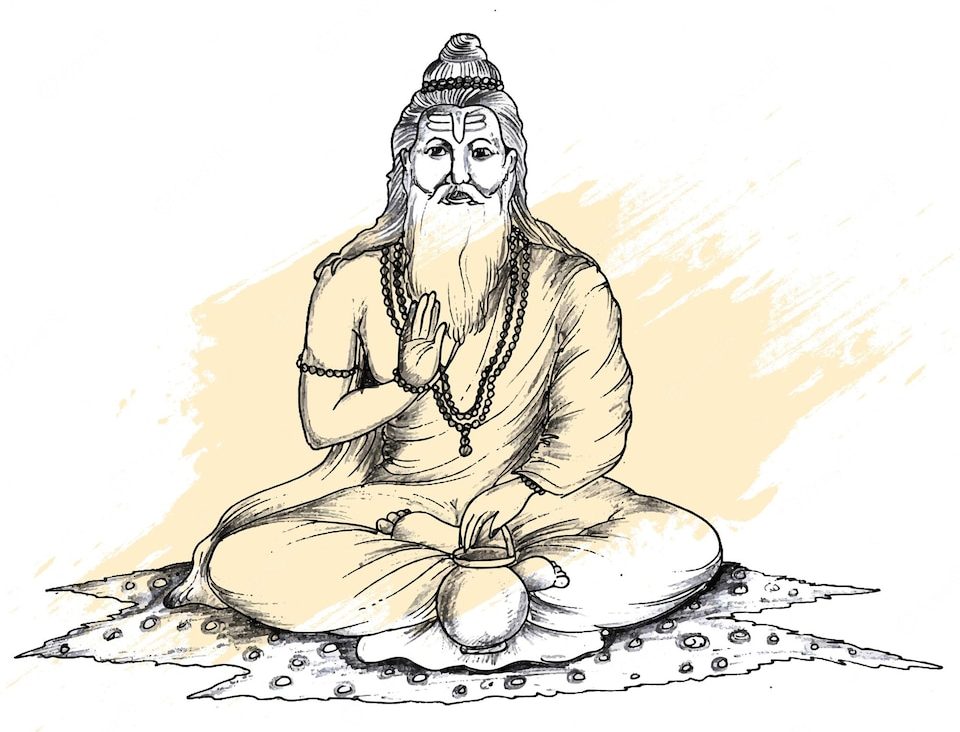
Maharishi Ved-Vyas
The Compiler of Vedas and the Legacy of Ancient Indian Wisdom
Introduction:
Maharishi Ved-Vyas, revered as Vyas, is a prominent sage in Hindu tradition, renowned for his unparalleled contributions to ancient Indian literature and spiritual wisdom. As the compiler of the Vedas, the sacred scriptures of Hinduism, and the author of the Mahabharata, an epic that includes the Bhagavad Gita, his life and teachings have profoundly shaped the spiritual landscape of India. This article delves into Maharishi Ved-Vyas’s early life and education, his career as a sage and teacher, his relationship with gods, his disciples, contributions to Hindu culture, and enduring legacy.
Early Life and Education:
The birth of Maharishi Ved-Vyas is steeped in legend. Born to the sage Parashara and a fisherwoman, Satyavati, he was named Krishna Dvaipayana Vyasa, signifying his dark complexion and being born on an island. He received a comprehensive education from various sages, making him well-versed in the Vedas, Puranas, and other ancient scriptures.
Career as a Sage and Teacher:
Having acquired profound knowledge, Maharishi Ved-Vyas devoted his life to preserving and organizing the Vedic knowledge. Recognizing the scattered and diverse nature of the Vedas, he compiled them into four distinct collections: Rigveda, Yajurveda, Samaveda, and Atharvaveda. This monumental task earned him the title “Vyas,” meaning the one who arranges or divides.
Relationship with Gods:
Maharishi Ved-Vyas had a divine connection and was considered an avatar of Lord Vishnu, making his teachings and writings divinely inspired. His spiritual insights and profound understanding of the scriptures allowed him to transmit ancient wisdom to humanity for generations to come.
Other Disciples:
Apart from his legendary disciples, such as Bhishma and Vidura, Maharishi Ved-Vyas had numerous other disciples who imbibed his teachings and contributed to preserving and disseminating ancient Indian knowledge. His Guru-shishya tradition became a cornerstone of Indian education and spiritual transmission.
Contributions to Hindu Culture:
Maharishi Ved-Vyas’s compilation of the Vedas ensured the preservation of ancient religious and philosophical texts, laying the foundation for Hinduism as we know it today. His masterpiece, the Mahabharata, not only narrates the epic Kurukshetra War but contains the Bhagavad Gita, a profound spiritual dialogue between Lord Krishna and Arjuna, encapsulating the essence of righteous action and devotion.
Legacy:
Maharishi Ved-Vyas’s enduring legacy is multifaceted. He played a pivotal role in shaping the Guru-shishya parampara, a traditional form of education where knowledge is transmitted from teacher to disciple. His compilation of the Vedas consolidated sacred knowledge, ensuring its perpetuation throughout the ages.
Overview of His Contribution in Hinduism:
Maharishi Ved-Vyas’s contributions are invaluable in shaping Hinduism’s spiritual and philosophical landscape. The Vedic knowledge he compiled remains the foundation of Hindu religious practices, rituals, and philosophies. The Mahabharata and the Bhagavad Gita continue to guide and inspire countless seekers on their spiritual journeys.
Books Written by Him:
Maharishi Ved-Vyas is credited with writing several significant works, including the eighteen Puranas, the Brahma Sutras, and the Mahabharata. The latter remains one of the most substantial and complex literary creations in human history.
Conclusion:
Maharishi Ved-Vyas’s life and work exemplify an unparalleled commitment to preserving and disseminating ancient Indian wisdom. His compilation of the Vedas, authorship of the Mahabharata, and the spiritual wisdom of the Bhagavad Gita continue to be cherished by millions worldwide. As the revered founder of the Guru-shishya tradition, Maharishi Ved-Vyas has left an indelible mark on Hindu culture and spirituality, inspiring generations to seek higher truths and spiritual enlightenment.
Editor – Kaalchakra Team
[ Note – Before Concluding anything as a Finale, Please Go through Original Scriptures of Vaidik Literature Written in Sanskrit and Also with Meaning of That time of Language. Because English is a Limited language to Explaining the Deeper Knowledge of Vaidik Kaal. ]
